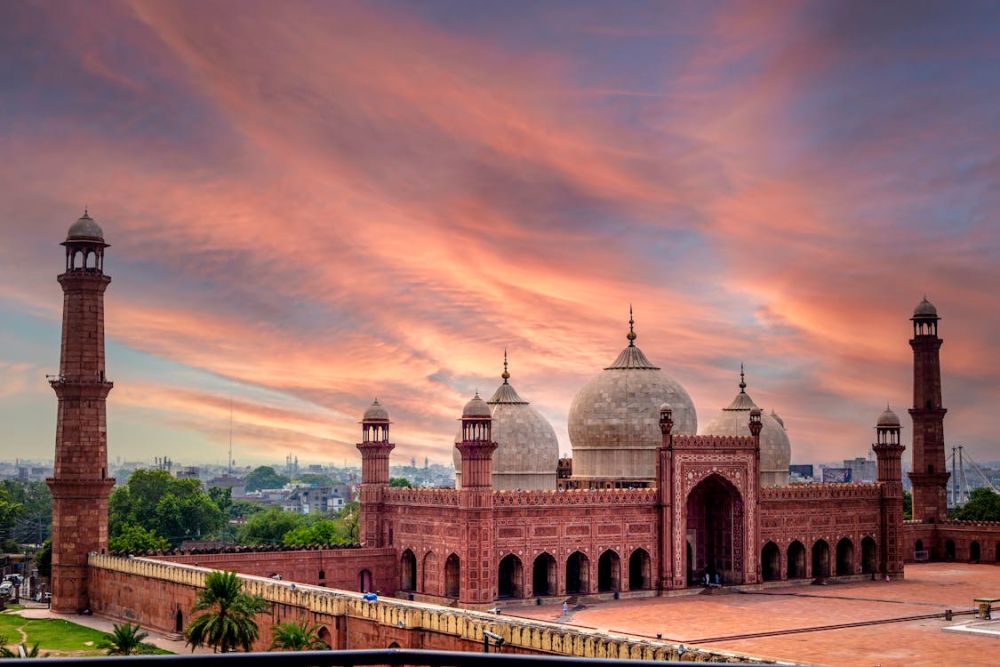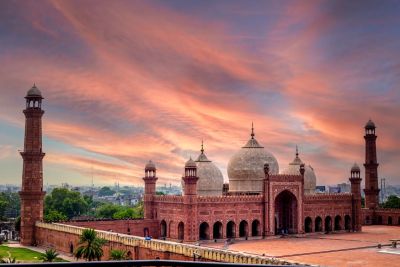

The Guided Historical Tour of the Badshahi Mosque is a journey through the rich tapestry of Mughal architecture and history. Visitors are led by knowledgeable guides who illuminate the mosque's past, from its commissioning by Emperor Aurangzeb in 1671 to its role in the cultural and religious life of Lahore. The striking red sandstone façade, intricate marble inlay work, and vast courtyard that can accommodate tens of thousands of worshippers are just a few of the highlights covered on the tour. Participants will gain insights into the mosque's design, which harmoniously blends Islamic and Persian influences, and may have the chance to observe traditional religious practices. The tour is not only a visual feast but also an educational experience, delving into the mosque's conservation efforts and its significance in Pakistan’s history.
Photography Sessions at the Badshahi Mosque allow visitors to capture the timeless beauty of one of the most iconic landmarks in Lahore. With its impressive gateways, grandiose minarets, and expansive courtyard, the mosque provides a stunning backdrop for photography enthusiasts. Aspiring and professional photographers alike can revel in the early morning light or the golden hues of sunset, which accentuate the mosque's intricate details and towering structure. Attendees should be prepared to exercise respect and discretion, particularly when the mosque is in use for prayer services. These sessions cater to anyone looking to photograph the mosque for personal memories, professional portfolios, or academic projects. It is an exceptional opportunity to document one of the architectural marvels of the Mughal Empire and a pivotal place of worship for the Islamic community.
Cultural Events and Festivals at the Badshahi Mosque are a vibrant showcase of Pakistan's rich traditions and religious festivities. Throughout the year, the mosque hosts a variety of events that are deeply rooted in Islamic culture and tradition. These include Eid celebrations, which mark the end of Ramadan with communal prayers and social gatherings within the mosque's expansive grounds. Special lectures and religious discourses are also organized during significant Islamic months such as Muharram and Rabi' al-awwal. Visitors can witness the confluence of faith and cultural expression through these events, which often feature traditional music, Sufi recitations, and communal iftars during Ramadan. Attending these events provides an intimate look at the communal facets of Islamic worship and the role that the Badshahi Mosque continues to play as a center for spiritual and cultural life in Lahore.
Educational Workshops at the Badshahi Mosque offer informative sessions on Islamic history, art, calligraphy, and architecture. Participants can engage in structured workshops led by scholars and experts in various fields related to Islamic studies. These workshops may cover the historical significance of the mosque, Islamic jurisprudence, or the intricacies of Mughal art and construction techniques. For those interested in the artistic aspects, there are calligraphy workshops that teach the art of beautiful Islamic script, a fundamental element in Islamic art seen throughout the Badshahi Mosque's walls and arches. Other sessions might involve learning about traditional geometric patterns and their applications in Islamic decorative arts. The workshops aim to provide enriching experiences for students, tourists, and local enthusiasts keen on learning about the cultural heritage enshrined within the colossal structure of the mosque.
The Nighttime Light and Sound Show at Badshahi Mosque is an enchanting display that brings the mosque's history to life through a combination of dramatic lighting and audio narration. As darkness falls over the city, the mosque is illuminated in a spectacle of lights that highlight its grand architecture and decorative elements. A narrated history is played over speakers, telling tales of the Mughal Empire, the construction of the mosque, and its significance throughout the centuries. This immersive experience allows visitors to see the mosque in a completely different light, quite literally, and provides a memorable way to learn about the landmark's past and its importance to the city of Lahore. The show is a popular attraction for both tourists and locals, creating a magical atmosphere around one of Pakistan's most precious cultural treasures.
Prayer Participation at the Badshahi Mosque is a profound spiritual experience, offering a chance to join the local community in Islamic worship. Five times a day, the mosque reverberates with the call to prayer, beckoning the faithful to its vast courtyard and prayer hall. Visitors can observe or partake in the prayers led by an Imam, experiencing firsthand the serenity and communal spirit of Islamic worship. For non-Muslim guests, it is a unique opportunity to witness the mosque's primary function as a place of congregational prayer, while also enjoying the building's incredible acoustics and spiritual ambiance. Attending a prayer session also allows for personal reflection within the context of a bustling historical monument, further enriching the understanding of the mosque's importance in the lives of Muslim worshippers.
Qawwali Music Performances at the Badshahi Mosque present the soul-stirring music genre that is central to the Sufi tradition in South Asia. On special occasions, or during religious festivals, the mosque's courtyards come alive with the powerful vocals and rhythmic beats of Qawwali groups. Qawwali is a form of devotional music that seeks to connect the listener with the divine through repetitive chants and hymns. The performances in the mosque, backdropped by its historic and spiritual majesty, are especially poignant. Visitors are swept up in the atmosphere of fervor and devotion, which is further amplified by the reverberation of the sound off the high walls and domes. These musical evenings can be transformative experiences, transcending religious lines and drawing people together through the universal language of music.
Sunset Views from the Minarets at the Badshahi Mosque offer a breathtaking panoramic vision of Lahore. For the adventurous and the romantics, this activity presents an opportunity to ascend one of the towering minarets and witness the sunset over the bustling city. As the sun dips below the horizon, the skyline is painted with vibrant hues, providing a picturesque contrast against the mosque's silhouette. It's a time for quiet contemplation and appreciation of the mosque's strategic placement within the cityscape, offering views of the Lahore Fort and the Hazuri Bagh. The experience is a testament to the grandeur of Mughal town planning and architectural prowess. Visitors should note that access to minarets may be restricted, and it's important to check with mosque authorities before planning this activity.
Architectural Sketching and Painting sessions at the Badshahi Mosque engage artists in capturing the intricate details and grandiose scale of this historic structure. The mosque, with its expansive courtyards, tall minarets, and detailed façades, provides endless inspiration for those interested in fine arts. Artists can set up their easels and sketchbooks within permitted areas and spend hours translating the beauty of the mosque onto their canvases. It's not uncommon to see students from art institutes, professional painters, or tourists with a penchant for art quietly working around the mosque. This activity allows for a deeper connection to the architecture and an appreciation of the mosque's aesthetic elements in a tranquil, yet creatively stimulating, environment.
Ramadan Iftar Experience at the Badshahi Mosque is a time for spiritual renewal and communal harmony. During the holy month of Ramadan, Muslims fast from dawn until sunset, and the mosque becomes a center for the breaking of the fast, or 'Iftar'. Visitors can take part in this special occasion, which starts with the Maghrib prayer followed by the sharing of a meal. The mosque's courtyard is often filled with rows of people from all walks of life sitting together to partake in the Iftar, traditionally opened with dates and water. This activity is not only about sharing food but also fostering a sense of community and goodwill among attendees. Non-Muslims are welcomed and encouraged to join in this cultural and religious observance, making it a potent symbol of unity and hospitality characteristic of Lahore.
